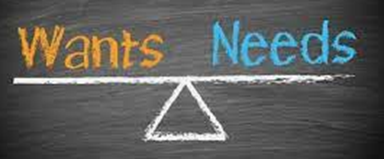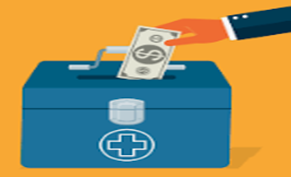5 Rules to Improve Your Financial Health
The term “personal finance” refers to how you manage your money and plan for your future. All of your financial decisions and activities have an effect on your financial health. It’s always important to consider what we should be doing to help improve our financial health and habits.
This week we discuss five broad personal finance rules that can help get you on track to achieving whatever your financial goals may be.

1. Do the Math—Net Worth and Personal Budgets
Money comes in, money goes out. For many this is about as deep as their understanding gets when it comes to personal finances. Rather than ignoring your finances and leaving them to chance, a bit of number crunching can help you evaluate your current financial health and determine how to reach your short- and long-term financial goals.
Click here is a link to the Federal Governments Money Smart Budget Planner which is a useful tool to get you started.
2. Recognize and Manage Lifestyle Inflation
Most individuals will spend more money if they have more money to spend. As people advance in their careers and earn higher salaries, there tends to be a corresponding increase in spending, a phenomenon known as “lifestyle inflation.”
As your professional and personal situation evolves over time, some increases in spending are natural. You might need to upgrade your wardrobe to dress appropriately for a new position, or, as your family grows, you might need a house with more bedrooms. With more responsibilities at work, you might find that it makes sense to hire someone to mow the lawn or clean the house, freeing up time to spend with family and friends and improving your quality of life.
As you enter into different phases of life, re-evaluate your personal budget to have it reflect the right conditions in your life. When preparing a list of your expenses, evaluate which costs are truly needed and which you can go without.
3. Recognize Needs vs. Wants—and Spend Mindfully
It’s in your best interest to be mindful of the difference between “needs” and “wants”. Needs are things you have to have in order to survive: food, shelter, healthcare, transportation, clothing. It's also important to set aside money each month for savings, although that is much more contingent on your other needs being met first.
Conversely, wants are things you would like to have but don’t require for survival. These costs may be engrained in our daily lives, so they may feel like needs. Whether it's a TV streaming subscription that isn't necessary for survival or skipping a morning treat that is now part of your daily routine, wants are items that are non-essential.
The line between "wants" and "needs" can be blurred at times. A car is a good example. Depending on your city's public transportation, you might be able to make the case that a car is a "want". However, for the many of us that consider it a "need", what type of car is appropriate? What is an appropriate balance between a higher car payment and a nicer vehicle?
Your needs should get top priority in your personal budget. Only after your needs have been met should you allocate any discretionary income toward wants. Again, if you do have money left over each week or each month after paying for the things you really need, you don’t have to spend it all.

4. Start Saving Early
It’s often said that it’s never too late to start saving for retirement. That may be true (technically), but the sooner you start, the better off you’ll likely be during your retirement years. This is because of the power of compounding
Compounding involves the reinvestment of earnings, and it is most successful over time. The longer earnings are reinvested, the greater the value of the investment, and the larger the earnings will (hypothetically) be.
5. Build and maintain an Emergency Fund
An emergency fund is just what the name implies: money that has been set aside for emergency purposes. The fund is intended to help you pay for things that wouldn’t normally be included in your personal budget. This includes unexpected expenses such as car repairs or an emergency trip to the dentist. It can also help you pay your regular expenses if your income is interrupted
Although the traditional guideline is to save three to six months’ worth of living expenses in an emergency fund, the unfortunate reality is that this amount would often fall short of what many people would need to cover a big expense or weather a loss in income. In today’s uncertain economic environment, most people should aim for saving at least six months’ worth of living expenses—more if possible.
Keep in mind that establishing an emergency backup is an ongoing mission. Odds are that as soon as it is funded, you will need it for something. Instead of being dejected about this, be glad that you were financially prepared and start the process of building the fund again.

Copyright © 2024 Coastline Private Wealth, All rights reserved.
Our mailing address is:
PO Box 2082
Churchlands WA 6018







